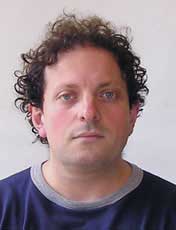The Fellowships will support Dr Howard Falcon-Lang’s work on Carboniferous palaeoclimates, Dr Marcello Ruta’s research on the evolutionary dynamics of tetrapods and Dr Marko Scholze’s work on the dynamics of terrestrial ecosystems. The Fellowships start in October 2008 and each lasts for five years.
Dr Falcon-Lang will be studying spectacular 300-million-year-old fossil forests that he discovered recently with US colleagues in the underground workings of a coalmine, in Illinois, USA. He will investigate how climate change wiped out these first rainforests and think about what this tells us about the impact of global warming on the rainforests of the future.
Dr Ruta’s research will investigate the response of terrestrial vertebrates to the most dramatic ecological disaster on record, the end-Permian mass extinction event, which took place around 251 million years ago. The project aims to evaluate the chronology and dynamics of extinction and origination episodes across this critical time interval. Reconstructions of evolutionary relationships in fossil vertebrate groups will be combined with advanced statistical and analytical protocols in order to quantify the decline and rebuild of ancient terrestrial ecosystems and to provide a detailed account of the impact of large-scale biological crises and their aftermath.
Dr Scholze proposes to quantify the current global carbon cycle, and evaluate mitigation strategies, an important issue for international climate policy negotiations. He will use an advanced computational approach to optimise process-based numerical models of the atmospheric, terrestrial and oceanic carbon cycle, making full use of the increasing volume of relevant observations from surface-based atmospheric measurements and satellites.
NERC normally awards seven or eight such Fellowships each year, covering researchers from institutions across the country working in the broad fields of earth sciences and ecological and evolutionary biology. It is very unusual for three awards in one funding round to be made to the same department within one institution.
Head of Department Professor Mike Benton said: ‘The Department of Earth Sciences in Bristol has many extremely bright young research fellows, and it is probably the most successful in the country at drawing such young colleagues from around the world. I'm delighted with this achievement, and the three new advanced fellows represent talent drawn from England, Italy and Germany.’


